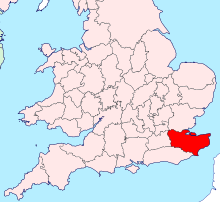Kentish dialect

The Kentish dialect is a dialect of English spoken in and around the county of Kent in southeast England. Kentish dialect combines many features of other speech patterns, particularly those of East Anglia, the Southern Counties and London.
Description
There are audio examples available on the British Library website and BBC sources,[1] As with many traditional dialects in England, the Kentish dialect has been receding in recent decades. In the 1980s and 1990s, the popular media discussed the spread of so-called Estuary English throughout Kent, as a London-based dialect that was replacing the traditional Kentish speech.
The dialect of Kent has had a greater influence on the modern language than many others. When William Caxton invented the printing press, he began the standardisation of the English language[2]; the county had more than its fair share of presses. Consequently, many of the first books to be published were by Kentish writers, and this helped spread Kent dialectal words (e.g. 'abide', 'ruck') to the rest of the country[3]. Printed books also helped standardise spellings; those of writers in the South East often became favoured, which is why the Kentish 'left' superseded other Middle English alternatives for the word, such as 'lift' and 'luft''[4].
Pronunciation
Modern Kentish dialect shares many features with other areas of southeastern England, sometimes collectively called "Estuary English". Other characteristic features are more localised. For instance, some parts of Kent, particularly in the northwest of the county, share many features with broader Cockney.
Typical Kentish pronunciation features include the following:
- Yod-coalescence, the use of the affricates [dʒ] and [tʃ] for the clusters /dj/ and /tj/ in words like dune and Tuesday. Thus, the words sound like June and choose day, respectively.
- Diphthong shifts, the use of open [ɑɪ] or rounded [ɒɪ] for /aɪ/ in words like pie or the use of [æɪ~aɪ] for /eɪ/ in words like take.
- A lengthened [æ] appears often before voiced consonants, such as in ladder.
- H-dropping, deleting [h] in stressed words: [æʔ] for hat. It is thought to have first started by Londoners some 300–400 years ago.
- Vowel shortening in certain words: /iː/ becomes [ɪ] in words like seen (but not scene, which regularly uses the shifted diphthong [əi~ɐi]).
Regional variations
Kent is a large county that for centuries was administered as East Kent (men of Kent) from Canterbury and West Kent (Kentish men), parts have become London boroughs. [5]
The dialect varies from rural Rainham to industrial Gillingham, from that of the fishermen of Dungeness [6]to the rural High Weald and Sevenoaks [7]. The pattern of speech in some of Charles Dickens' books pertain to Kentish dialect, as the author lived at Higham was familiar with the mudflats near Rochester and created a comic character Sam Weller who spoke the local accent, principally Kentish but with strong London influences.[8]
The area around Aylesham in Kent has a completely different dialect, as most of the residents of the area moved from other coalfields to work at the new collieries sunk in Kent during a period when employment in mining had been falling nationally. As the miners came from areas of Scotland, Wales, and Northern and Central England, the dialect in this area has many features from the districts that the miners migrated from.[9]
Dialect words and phrases
- Alleycumfee - a non-existent place.
- Better-most - the best, something superior
- Cheesy bug - woodlouse
- Dabster, a dab hand - somebody very skilled at something
- Fanteeg - to be flustered
- Ha'ant - "Haven't." For example, "Ha'ant yew sin 'im yet?"
- Jawsy - a chatterbox
- March-men - people from the borders of two counties
- 'Od Rabbit It! - a minced oath
- Ringle - to put a ring in a pig's nose
- Scithers - scissors (clippers may have been "clithers.")
- Tutt - clutter (noun)
- Twinge - an earwig
- Wrongtake - to misunderstand
- Yarping - to complain, applied to children
The following[3] are Kentish words and phrases that will be more familiar to English speakers elsewhere:
- Addle - to be dazed or confused
- Allow - to think of, consider or regard
- Dumbledore - bumblebee
- Dunes - sand hills or hillocks near the sea
- Heft - weight
- Oast - kiln for drying hops
- Peaky - unwell, ill-looking
- Pikey - traveller on the turnpike, i.e. a vagabond or ruffian
- Radical - a troublemaker or rebel.
References
- ↑ "Kent Voices". BBC. 2005. Retrieved 7 September 2011.
- ↑ "History of Printing". www.bpsnet.org.uk. Retrieved 2017-12-17.
- 1 2 Howe, Ian (2012). Kent Dialect. Bradwell Books. p. 3. ISBN 9781902674346.
- ↑ "the definition of left". Dictionary.com. Retrieved 2017-12-17.
- ↑ Glover, Judith (1982). The place names of Kent. Rainham: Meresborough. pp. iv–vii. ISBN 0905270614.
- ↑ "Conversation in Dungeness about accent, dialect and attitudes to language. - BBC Voices - Accents and dialects | British Library - Sounds". sounds.bl.uk. Retrieved 27 June 2018.
- ↑ "Conversation in Sevenoaks about accent, dialect and attitudes to language. - BBC Voices - Accents and dialects | British Library - Sounds". sounds.bl.uk. Retrieved 27 June 2018.
- ↑ Parish 1888, p. vii
- ↑ Welcome to the north! New Dialect Formation in Kent's 'Sunshine Corner'. David Hornsby. Transactions of the Yorkshire Dialect Society 2016, pp.44-56.
Bibliography
- Parish, W.D.; Shaw (1888). The Kentish Dialect and Provincialisms (PDF). Lewes: Farncombe & Co.
- Major, Alan (2011). "Guide to the Kentish Accent". Historic Kent . com. Retrieved 7 September 2011.
External links
Kent Archaeological Society, online dictionary of the Kentish Dialect (378 pages)
Sidney Wood's page on Kentish dialect changes in the 19th and 20th centuries
Links to Charles Dickens and Kent: